The World Cup proved that Diego Maradona is no coaching genius, but nor was he the clown that some expected.
True, there were times when it wasn’t possible to observe the Argentine coach without humming the theme tune to The Benny Hill Show.
Picture, for example, the Argentine training session where Maradona pretended to beat up a member of his staff and theatrically acted as a target for his players to shoot a hail of balls at. He came out of it furiously rubbing the back of his head. Ho-ho, what a jester.
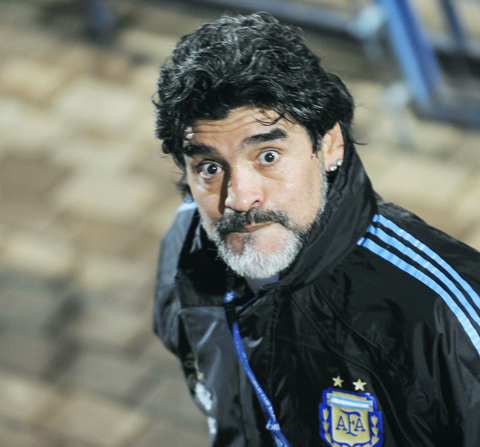
PHOTO: AFP
As Argentina’s victories piled up, however, there seemed to be method in Maradona’s madness. No other team had Argentina’s swashbuckling flair. With Gonzalo Higuain and Carlos Tevez slotting in goals and World Player of the Year Lionel Messi supplying inspiration, passes and even leadership on the field, it was possible to ignore the holes in Maradona’s defense and midfield, and not second-guess his decision to leave defender Javier Zanetti and midfielder Esteban Cambiasso at home.
Maradona’s strategy, if it can be called that, was to outscore not shut out opponents.
“Permanently on the attack” is how he lovingly described Argentina’s style of play.
“We are here to give joy to the Argentines, to play as we like, in the way which makes us happy,” he said.
What fun, but naive too.
Maradona used enthusiasm to compensate for his inexperience as a coach. He smothered his players with hugs and kisses, before and after games, because he had little else to offer in terms of tactical wizardry. The instructions he barked in practice were of the “come on,” “look alive,” variety, not useful nuggets of strategic insight.
He talked about the need for “sacrifice, blood and courage” from players, not about playing formations. His players, in turn, praised the value of his experience of having competed in four World Cups, not his game plans — if, indeed, there were any.
“Nobody ever told me where to play. So, I shouldn’t have to tell Messi where to play either,” Maradona said in the best example of his let-them-get-on-with-it approach.
He made no apologies for it. In fact, after three group-stage wins, he was demanding apologies from critics who had predicted that Argentina could only flop with the former cocaine addict in charge and waste their best chance in years of winning the World Cup.
“I’m not suggesting you drop your trousers, but it would be honest and great,” Maradona said.
The upside of Maradona hogging the limelight in South Africa with his large personality and entertaining, provocative press conferences was that he deflected attention from Messi and why the star forward wasn’t scoring.
The downside for Argentina was that Maradona failed, as he also did in World Cup qualifying, to make the most of Messi’s goal-scoring abilities. Too often, Messi was starved of the passes that help to make him such a match-winner for his club, Barcelona. That forced Messi to go hunting deep in the midfield himself for the ball.
Because of Argentina’s inbuilt defensive frailties and Maradona’s lack of alternate plans for when his plan A — attack, attack, attack — failed to work, there was always the suspicion that Argentina’s exciting adventure could slam into the buffers if the forwards couldn’t score. Yet few suspected that Argentina and Maradona would be found out quite so starkly as they were by Germany in the quarter-finals.
German manager Joachim Loew is his own greatest admirer, but it is also true that he thoroughly outthought Maradona, executing his game plan brilliantly — just as he did against the England side of Fabio Capello, a coach more experienced than Maradona.
Messi’s attacking runs broke against the rocks of a dogged, organized German defense, while the Argentine defense and Javier Mascherano in midfield were overwhelmed by the speed of the German forays.
Most importantly, the Germans played as a well-oiled team, finding each other with just the right pass at just the right time.
Argentina, in contrast, looked like talented individuals who just happened to be wearing the same blue and white stripped jerseys. As the German goals mounted up, it grew increasingly clear that Maradona had no answer. He looked so sad on the touchline.
This World Cup would not have been as much fun without Maradona, without the sight of him pacing up and down as though he were still out on the field kicking every ball, living every emotion, but it was always too much to expect that he would be the same genius as a coach as he was as Argentina’s greatest player.
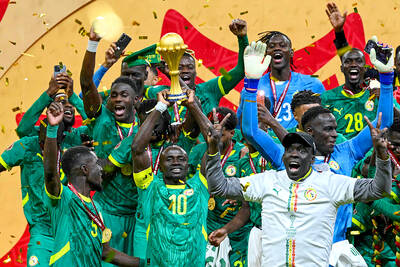
MARRED FINAL: As most of Senegalese players walked off the pitch after a controversial decision, some supporters threw objects and attempted to get onto the pitch Senegal on Sunday won the Africa Cup of Nations (AFCON) as Pape Gueye’s extra-time winner sunk hosts Morocco 1-0 after a chaotic final that saw the eventual champions storm off the pitch late in the game. Brahim Diaz could have won the trophy for Morocco with a controversial spot-kick in the 24th minute of added time at the end of normal time as ugly scenes broke out in the stands. However, Senegal goalkeeper Edouard Mendy easily saved the weak attempted “Panenka” chip by the Real Madrid winger, who was clearly distracted by the long delay that followed the penalty award.
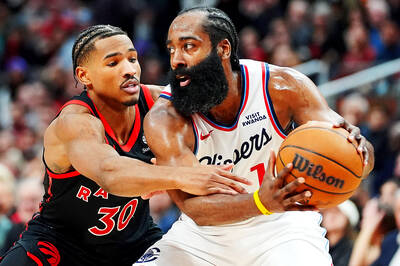
James Harden on Friday scored 31 points and came up big in overtime to help the Los Angeles Clippers erase a double-digit deficit on the way to a 121-117 NBA victory over the Toronto Raptors. Harden scored 16 points in the fourth quarter and overtime as the Clippers pushed their wining steak to five games despite the absence of star Kawhi Leonard with a sprained right ankle. The Clippers trailed by 11 entering the fourth quarter, but Harden drilled a pair of free-throws with 1:24 left in regulation to tie it and after misses from both teams, they went to
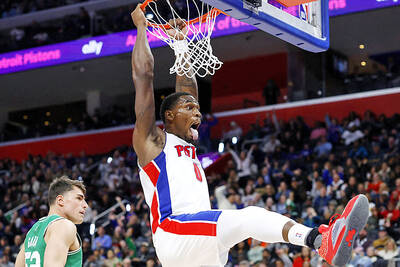
Tobias Harris on Monday scored 25 points as the Detroit Pistons held off the Boston Celtics to score a 104-103 victory in their top-of-the-table Eastern Conference showdown. Harris was one of four Detroit players to finish in double figures, with Jalen Duren adding 18 points and point guard Cade Cunningham scoring 16 points with 14 assists. The win sees Detroit extend their lead at the top of the Eastern Conference to 31-10, 5.5 games ahead of second-placed Boston, who fell to 26-16 with the defeat. Jaylen Brown led the Celtics scoring with 32 points and almost snatched victory in the
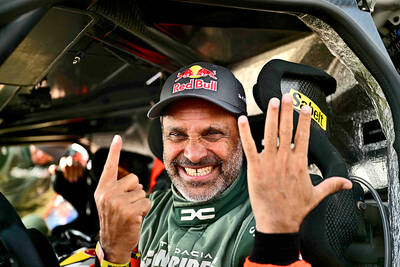
Qatar’s Nasser al-Attiyah on Saturday secured his sixth Dakar Rally car title in Saudi Arabia with Luciano Benavides scraping home by two seconds to claim the motorbike title. “We’ve worked very hard since last year. I might not be showing much emotion yet, but it’s there, deep down. We are so happy to win,” al-Attiyah said at the finish. Al-Attiyah, at the wheel of a Dacia, only had to avoid a final day slip-up to top the podium after bringing his career tally of stage wins to 50 on Friday. The 55-year-old, who took clay pigeon shooting bronze at the